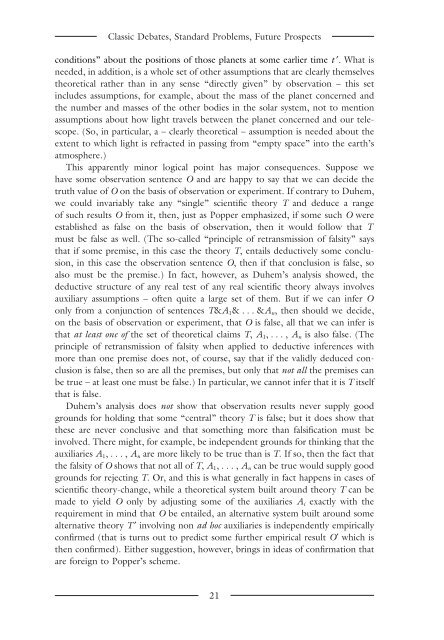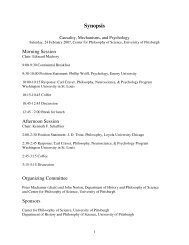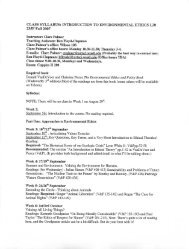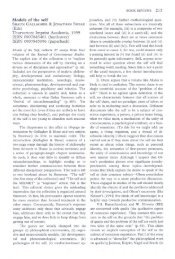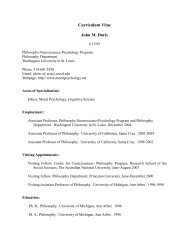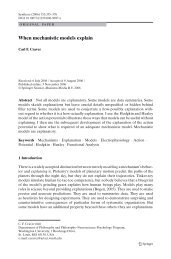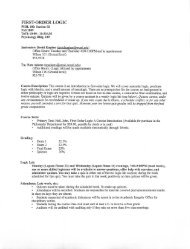The Blackwell Guide to the Philosophy of Science - The Department ...
The Blackwell Guide to the Philosophy of Science - The Department ...
The Blackwell Guide to the Philosophy of Science - The Department ...
You also want an ePaper? Increase the reach of your titles
YUMPU automatically turns print PDFs into web optimized ePapers that Google loves.
Classic Debates, Standard Problems, Future Prospects<br />
conditions” about <strong>the</strong> positions <strong>of</strong> those planets at some earlier time t ¢. What is<br />
needed, in addition, is a whole set <strong>of</strong> o<strong>the</strong>r assumptions that are clearly <strong>the</strong>mselves<br />
<strong>the</strong>oretical ra<strong>the</strong>r than in any sense “directly given” by observation – this set<br />
includes assumptions, for example, about <strong>the</strong> mass <strong>of</strong> <strong>the</strong> planet concerned and<br />
<strong>the</strong> number and masses <strong>of</strong> <strong>the</strong> o<strong>the</strong>r bodies in <strong>the</strong> solar system, not <strong>to</strong> mention<br />
assumptions about how light travels between <strong>the</strong> planet concerned and our telescope.<br />
(So, in particular, a – clearly <strong>the</strong>oretical – assumption is needed about <strong>the</strong><br />
extent <strong>to</strong> which light is refracted in passing from “empty space” in<strong>to</strong> <strong>the</strong> earth’s<br />
atmosphere.)<br />
This apparently minor logical point has major consequences. Suppose we<br />
have some observation sentence O and are happy <strong>to</strong> say that we can decide <strong>the</strong><br />
truth value <strong>of</strong> O on <strong>the</strong> basis <strong>of</strong> observation or experiment. If contrary <strong>to</strong> Duhem,<br />
we could invariably take any “single” scientific <strong>the</strong>ory T and deduce a range<br />
<strong>of</strong> such results O from it, <strong>the</strong>n, just as Popper emphasized, if some such O were<br />
established as false on <strong>the</strong> basis <strong>of</strong> observation, <strong>the</strong>n it would follow that T<br />
must be false as well. (<strong>The</strong> so-called “principle <strong>of</strong> retransmission <strong>of</strong> falsity” says<br />
that if some premise, in this case <strong>the</strong> <strong>the</strong>ory T, entails deductively some conclusion,<br />
in this case <strong>the</strong> observation sentence O, <strong>the</strong>n if that conclusion is false, so<br />
also must be <strong>the</strong> premise.) In fact, however, as Duhem’s analysis showed, <strong>the</strong><br />
deductive structure <strong>of</strong> any real test <strong>of</strong> any real scientific <strong>the</strong>ory always involves<br />
auxiliary assumptions – <strong>of</strong>ten quite a large set <strong>of</strong> <strong>the</strong>m. But if we can infer O<br />
only from a conjunction <strong>of</strong> sentences T&A1&...&An, <strong>the</strong>n should we decide,<br />
on <strong>the</strong> basis <strong>of</strong> observation or experiment, that O is false, all that we can infer is<br />
that at least one <strong>of</strong> <strong>the</strong> set <strong>of</strong> <strong>the</strong>oretical claims T, A1,..., A n is also false. (<strong>The</strong><br />
principle <strong>of</strong> retransmission <strong>of</strong> falsity when applied <strong>to</strong> deductive inferences with<br />
more than one premise does not, <strong>of</strong> course, say that if <strong>the</strong> validly deduced conclusion<br />
is false, <strong>the</strong>n so are all <strong>the</strong> premises, but only that not all <strong>the</strong> premises can<br />
be true – at least one must be false.) In particular, we cannot infer that it is T itself<br />
that is false.<br />
Duhem’s analysis does not show that observation results never supply good<br />
grounds for holding that some “central” <strong>the</strong>ory T is false; but it does show that<br />
<strong>the</strong>se are never conclusive and that something more than falsification must be<br />
involved. <strong>The</strong>re might, for example, be independent grounds for thinking that <strong>the</strong><br />
auxiliaries A1,..., An are more likely <strong>to</strong> be true than is T. If so, <strong>the</strong>n <strong>the</strong> fact that<br />
<strong>the</strong> falsity <strong>of</strong> O shows that not all <strong>of</strong> T, A1,..., A n can be true would supply good<br />
grounds for rejecting T. Or, and this is what generally in fact happens in cases <strong>of</strong><br />
scientific <strong>the</strong>ory-change, while a <strong>the</strong>oretical system built around <strong>the</strong>ory T can be<br />
made <strong>to</strong> yield O only by adjusting some <strong>of</strong> <strong>the</strong> auxiliaries Ai exactly with <strong>the</strong><br />
requirement in mind that O be entailed, an alternative system built around some<br />
alternative <strong>the</strong>ory T ¢ involving non ad hoc auxiliaries is independently empirically<br />
confirmed (that is turns out <strong>to</strong> predict some fur<strong>the</strong>r empirical result O¢ which is<br />
<strong>the</strong>n confirmed). Ei<strong>the</strong>r suggestion, however, brings in ideas <strong>of</strong> confirmation that<br />
are foreign <strong>to</strong> Popper’s scheme.<br />
21


